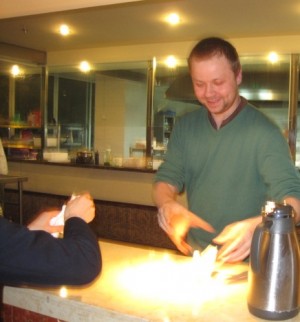Living Abroad: One Business Man’s Ventures in China
Editor’s Note: China has long been regarded as the most populous area in the world and a strategist in business, the arts, and sciences. While its travesties in all areas are significant to the evolution of the human race, it is its unique personalities that hold the most interest. In a special series, our writer, Karl Arney, who currently resides in China, will be bringing us closer to the people who reside there, both immigrant and native, in hope of giving us a taste of the Chinese culture and the faces that stand behind it.
Wojciech Szpakowski, an undertaker of business ventures, has lived in a city in middle China that you’ve probably never heard of for the better part of 10 years. And he has no intention of leaving any time soon.
For the past two and a half years I have also lived in Zhengzhou, the capital of the Henan Province and Szpakowski’s adopted home. While Chinese cities like Beijing and Shanghai are in many ways world class cities, Zhengzhou remains a long way off. My comparatively short stay here has often felt like a test of endurance, so when I learned there was someone who’d spent the past decade here, largely outside of the foreign community, my curiosity was piqued.
What little I’d heard of Szpakowski made him sound like an eccentric old recluse. Therefore, when I entered the McDonald’s we had agreed to meet in, I expected the scruffy, shell-shocked sort of forgotten expat you sometimes encounter in Asia.
Instead, I was greeted by a tall, hardy and clean-shaven 31-year-old. I caught his eye coming in and he greeted me with a beaming smile, full and rosy cheeks still visible from the cold outside, and a cup of savory warm coffee for me. A native of Łódź, Poland, he attended Warren Wilson College in North Carolina (“a hippy school”) before going to Shanghai to study Chinese in 2001, shortly before China joined the World Trade Organization (WTO).
“I originally wanted to go to Japan, but somehow I wound up coming to China,” he said, “My mother did not want me to come here.”
His earliest experiences seemed to confirm his mother’s wariness, but a shift in location changed everything.
“Shanghai was too big – I got depressed by the culture shock, so I came to Zhengzhou, started studying Chinese at Zhengzhou University, and got drunk every day with friends. It was easy to forget my problems,” he explained, succinctly covering his seemingly random choice of Chinese city.
A short time into discussing what he’s been doing here, it became apparent why Szpakowski has been comfortably suited to life in a mid-tier Chinese city. The man is an insatiable entrepreneur, virtually bursting with business ideas in a place where concepts we consider run-of-the-mill are still relatively fresh and open.
Ten minutes in, he pitched me a job with an essay-assistance company he wants to get going for Chinese students going abroad. We’d no sooner moved away from that when he was probing my interest in teaching for a kindergarten-starter program he runs.
On returning to the interview, Szpakowski moved naturally to his business history in China. His first venture involved shipping Chinese linens to Europe with his brother.
“It was a disaster…but you always learn something,” he told me with a sly grin.
Following the linen business, he opened a pair of Polish-style bakeries with two Polish bakers and three Chinese. These lasted over a year, but ultimately “it was hard to get the local kids used to foreign bread,” and he again moved on.
It was around then that he got involved with schooling; though he also took time to move to Chengdu to manage a successful restaurant some relatives had opened. When his relations soured with his family there, he returned to Zhengzhou and things began to stabilize. He started his kindergarten program, bought a house and car, got married, had a child, and “settled in.”
His commentary on his family was considerably more restrained than on business. When asked about his home life, he laughed and shrugged his shoulders.
“What is there to say? I have a wife, a one-and-a-half- year-old kid name Iza, a dog I have had since 2004, and a fish,” he said convivially.
(Article continued on next page)

